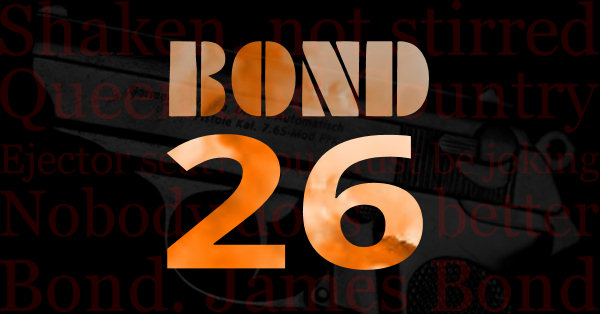After Eric Serra’s score for Goldeneye met with a less than positive response, the producers of the next instalment of the 007 series, Tomorrow Never Dies, once again had to search for a new composer. And, thanks to a recommendation from the man whose name will forever be associated with the music for 007, an English producer and Bond fanatic was entrusted with scoring the eighteenth Bond film.
David Arnold first came to prominence when his collaboration with Bjork, Play Dead, reached the UK top twenty after featuring in the film The Young Americans. Having scored the major movie hit Independence Day, Arnold then turned to one of his true love – the music of James Bond – for his next project.
Tomorrow Never Dies (1997)
1. Tomorrow Never Dies
2. White Knight
3. The Sinking of the Devonshire
4. Company Car
5. Station Break
6. Paris and Bond
7. The Last Goodbye
8. Hamburg Break In
9. Hamburg Break Out
10. Doctor Kaufman
11. *-3-Send
12. Underwater Discovery
13. Backseat Driver
14. Surrender
15. James Bond Theme
Arnold arranged and produced Shaken and Stirred: The David Arnold James Bond Project which involved eleven contemporary artists including Pulp, Chrissie Hynde and Iggy Pop covering classic Bond themes. Legendary Bond composer John Barry was extremely complimentary about Arnold’s work, saying: “He was very faithful to the melodic and harmonic content, but he’s added a whole other rhythmic freshness and some interesting casting in terms of the artists chosen to do the songs. I think it’s a terrific album. I’m very flattered.”
Indeed, Barry was so impressed with Arnold’s work that he recommended the composer to Bond producer Barbara Broccoli who hired the 34 year old to score Tomorrow Never Dies.
The fact that Arnold was a huge fan of the Bond series informed his approach to his work. Arnold understood the importance of the music in the 007 films, and confessed: “I’m writing music for this film the way I’d want to hear it if I was a fan going to see it in the cinema”.
Rather than moving the sound of Bond in a completely new direction, Arnold was keen to retain the key elements that characterised Barry’s best work whilst seeing it as “a good chance to do something contemporary and exciting and rhythm driven”.
Whilst Arnold provided the score for Tomorrow Never Dies, he ultimately would not provide the theme song. As part of a competitive process, Arnold’s submitted a song co-written with Don Black, the lyricist responsible for several Bond themes including Thunderball, Diamonds are Forever and The Man With The Golden Gun. The bold, brassy Tomorrow Never Dies was performed by the Canadian singer k.d.lang and beat off competition from artists including Marc Almond, Pulp, Swan Lee and Saint Etienne to be chosen as the theme.
Arnold then wove the melody from his theme into his soundtrack for the film, particularly during action sequences and the dramatic piece All In A Day’s Work. However, at the last minute, the producers decided to choose another song as the title track. As American singer Sheryl Crow was deemed more ‘popular’, her Tomorrow Never Dies (‘the most interesting one’ of the songs according to producer Michael Wilson) replaced Arnold’s effort. The k.d.lang track was renamed Surrender and was used over the end credits for the film.
As the decision was made so late, Arnold was unable to incorporate the melody from Crow’s song into his score. Consequently, as with several of the previous Bond films, the soundtrack suffers from a lack of consistency between the theme tune and the rest of the soundtrack.
What this shouldn’t disguise though is the quality of Arnold’s work on Tomorrow Never Dies. He manages to perfectly combine a traditional, Barry-esque Bond sound with contemporary rhythms and instrumentation. A perfect example is Backseat Driver, a thumping bass-driven action theme produced in collaboration with the British electronic band the Propellerheads.
The Sinking of the Devonshire is a superbly arranged seven minute piece whilst the melancholy Paris and Bond and The Last Goodbye are perfect 007 love themes. The highlight however is White Knight – the piece that underscores the pre-credit sequence – which is quite simply one of the finest individual pieces of James Bond music in the series’ history.
Due to time constraints, the scoring of the film had not been completed by the time of the original album release. The 1997 version of the Tomorrow Never Dies soundtrack therefore only contains music from the first hour of the film. A second album was released three years later which featured additional tracks including the excellent Boarding the Stealth and Kowloon Bay.
In David Arnold, the Bond producers found a man with an ability to carry Bond music into a new era. John Barry clearly saw how capable Arnold was of bringing the sound of 007 into the 21st century, and Arnold has been retained to provide the soundtrack for each of the Bond films since. Tomorrow Never Dies is a quite superb record only spoiled by the late decision not to retain Arnold’s theme as the title track.
More on James Bond soundtracks











July 8th, 2011 at 04:55
A decent album. It towers over its predecessor. I believe the producers brought in Serra in order to attract a younger, newer audience. I guess that didn’t work out. I guess it worked in the film but was less than listenable as an album. But anyways…
I don’t mind Arnold’s approach to soundtracks although I know others who aren’t crazy about his composing skills. Not a bad album by any means.
I would go so far as to say that Tomorrow Never Dies had possibly the best Bond theme song of all time for me. I say possibly because even if I weren’t a Beatle fan I would still hold Live and Let Die in high regard. So I’ll just put it down to a toss up between the two.
On a related subject there’s also the Tomorrow Never Dies videogame soundtrack which had a notable cover of the James Bond Theme plus a very nice Bondian track called Letter to Paris.